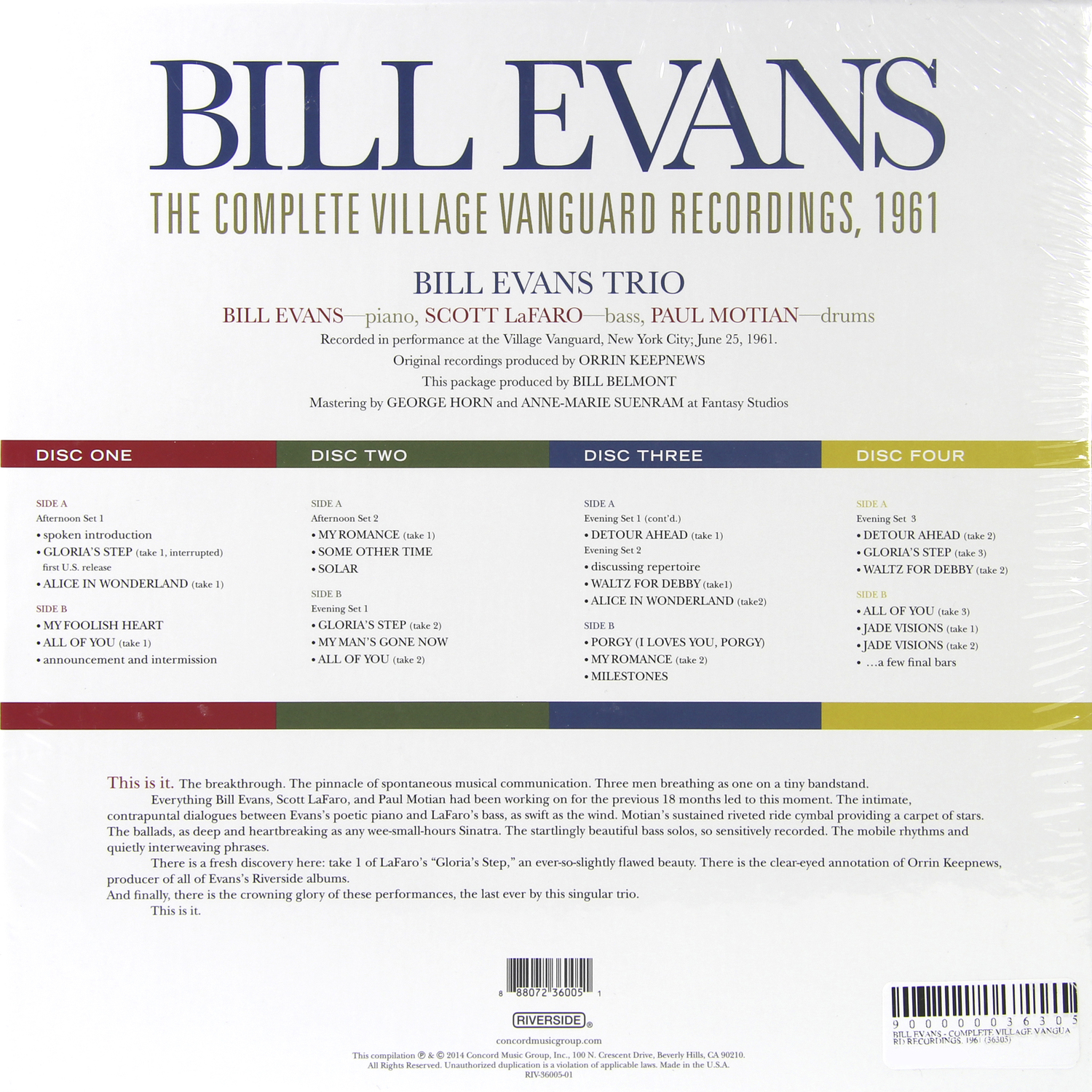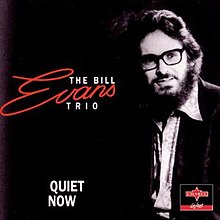

By Concord Music Group
Concord Music Group is proud to announce the forthcoming vinyl reissue of Bill Evans’ The Complete Village Vanguard Recordings, 1961, one of the greatest live jazz recording sessions of all time. Pressed on 180-gram vinyl, the four-LPs box set is packaged with a 12-page booklet, complete with new liner notes by reissue producer Bill Belmont, as well as the original liner notes by the producer of the initial recordings, Orrin Keepnews. Reproductions of Keepnews’ session annotations and photographer Steve Schapiro’s proof sheets from the performances add vintage context to the packaging. As a bonus, a stunning metallic and black poster of the famous cover—Evans, in profile, deep in concentration at his piano—completes the box set.
Ranked time after time as one of the best live jazz recording sessions in history, and yielding two of Evans’ most classic albums (Waltz for Debby, Sunday at the Village Vanguard),The Complete Village Vanguard Recordings, 1961 represents the pinnacle of spontaneous musical communication: three men breathing as one on a tiny bandstand. The performances on these LPs demonstrate a new and more interactive approach to playing as a trio, one in which all instruments carry melodic responsibilities and function as equal voices. Keepnews recalls in his liner notes that “from the very first moments of the recording, it was impossible to ignore the importance of these performances.”
Everything Bill Evans, Scott LaFaro, and Paul Motian had been working on for the previous 18 months led to this moment on June 25, 1961. The little-known pianist and his trio performed afternoon and evening sets that Sunday to a small audience that unknowingly sat through what would become a very famous—and final—set by the trio (the 25-year old LeFaro died tragically in a car accident just days later). These recordings provide something of a sonic time capsule: sequenced in the original order of the five sets, the audience’s murmurings and applause are peppered throughout; even an interrupted take is left intact. Belmont recalls the process of piecing the performance back together during the remastering process: “As was the practice with early live recording, the songs [on the original album] were faded just after the last note, and much, if not all, of the audience and banter from the stage was removed. So the first stage of the process was to find the reels—if they existed—and try and make a reconstruction of everything that was recorded…The task was to try to make the show flow as closely as possible to what had been recorded.”
By Jeff Tamarkin at JazzTimes
Concord Music Group is reissuing Bill Evans’ The Complete Village Vanguard Recordings, 1961, as a vinyl box set. Pressed on 180-gram vinyl, the four LPs are packaged with a 12-page booklet, complete with new liner notes by reissue producer Bill Belmont, as well as the original liner notes by the producer of the initial recordings, Orrin Keepnews. The set also includes reproductions of Keepnews’ session annotations and photographer Steve Schapiro’s proof sheets from the performances. As a bonus, according to a press release, a metallic and black poster of the album cover—Evans, in profile, deep in concentration at his piano—completes the box set.
The original recording was made June 25, 1961, at the New York venue and features pianist Evans with bassist Scott LaFaro and drummer Paul Motian.
Concord also plans a 12-disc reissue of The Complete Riverside Recordings for early 2015. That set presents all 20 recording sessions from the eight-year period (1956-63) that launched Evans’ career. These 151 performances are presented in what’s described as “a sleek brick box,” along with a 32-page illustrated booklet. Due in January is the four-LP set The Complete Tony Bennett/Bill Evans Recordings, which encompasses the duets Bennett and Evans recorded in 1975 and 1976. New liner notes by music critic and co-author of Bennett’s autobiography, Will Friedwald, complete the package.
Track Listing for The Complete Village Vanguard Recordings, 1961:
Disc 1
Side A:
1. Spoken Introduction 00:43
2. Gloria's Step (Take 1, Interrupted) 5:41
3. Alice In Wonderland (Take 1) 6:57
Side B:
1. My Foolish Heart 4:55
2. All Of You (Take 1) 8:14
3. Announcement And Intermission 1:44
Disc 2
Side A:
1. My Romance (Take 1) 7:11
2. Some Other Time 5:02
3. Solar 8:57
Side B:
1. Gloria's Step (Take 2) 6:10
2. My Man's Gone Now 6:21
3. All Of You (Take 2) 8:29
Disc 3
Side A:
1. Detour Ahead (Take 1) 7:17
2. Discussing Repertoire 00:31
3. Waltz For Debby (Take 1) 6:46
4. Alice In Wonderland (Take 2) 8:31
Side B:
1. Porgy (I Loves You, Porgy) 6:09
2. My Romance (Take 2) 7:26
3. Milestones 6:31
Disc 4
Side A:
1. Detour Ahead (Take 2) 7:41
2. Gloria's Step (Take 3) 6:48
3. Waltz For Debby (Take 2) 7:00
Side B:
1 All Of You (Take 3) 8:18
2. Jade Visions (Take 1) 4:12
3. Jade Visions (Take 2) 3:57
4. ...A Few Final Bars 1:15


